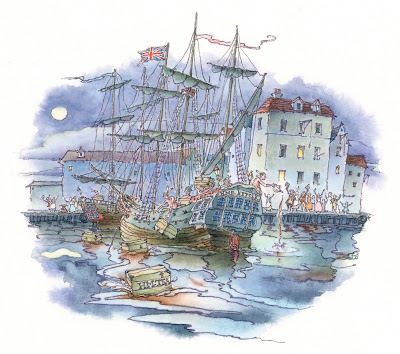Compared to today's revolts, the Boston Tea-party (1773) might appear to be just that. One wonders why some of the rebels even bothered to disguise themselves as 'Red-Indians'.
Perhaps most of the settlers originally from Europe, in the then British colonies who appreciated tea, reasoned that only 'savages' would throw good tea overboard. It would make sense to blame such an uncivilised act on those then considered to be uncivilised.
Although North American Indians never took afternoon tea with cucumber sandwiches, the 'civilised world' was slow in grasping the fact that in many ways it was far less civilised than the natives of North America who had been living there for countless centuries before being brutally ousted by the arrival of an assortment of ever increasing land-grabbing Europeans.
Tragically most of the Indians and much of their culture- a deep respect for Nature and her resources, the integrality of the real, unreal and supernatural- had been wiped out long before the irrevocable reality of this was finally dawned upon.
However, the Brits, even under a King who talked to trees, already had the makings of a sophisticated secret intelligence service, seeds of the MI5, so they weren't completely duped by the Indian disguises. They had a hard enough time getting the colonists to pay British taxes, without considering how they could rip-off the Indian communities in the British colonies as well. But the British were naturally outraged and everyone agreed that it was indeed a savage act.
Amongst other British Commonwealth responsibilities, a trade slump in Europe, and famine in Bengal, (1770) the British government was desperate to find the necessary means to pay its armies whose official roll was to protect the British colonies and colonists. Considering the British army's military capacity in North America in the 18th century, at times the rolls between the army and the settlers could well have been reversed. Nevertheless, this was one of the reasons why the 'Tea Act' was infused by Parliament under King George III. It was therefore decided that the colonists should pay tax on tea. The idea was all the more tedious and unnecessary because apparently the East India Company's tea stocks were then brimful.
Maybe the British Government should have waved the tea tax and encouraged the colonists to make better coffee. This might have radically altered the path of history regarding the birth of the USA, but it could have vastly improved relations between Europeans and Americans for posterity, concerning the general appreciation of potable coffee in America.
At the time of the Boston Tea-party, which boiled down to a reasonable refusal to pay tax on tea anyway, it's likely that no one was aware that such a storm in a teacup- the dumping of three ships' cargoes of 342 chests of Tea into Boston harbour- would lead to the War of Independence (1775-1782) only two years later.
But the USA had to be born one way or the other, and George Washington succeeded admirably in ensuring that this was so, not only as a fine military tactician, but also as the first, and no doubt one of the greatest Presidents (1789-97) in the history of the United States of America.
During the colonial period, the English and French were always at loggerheads for lucrative positions. Yet whilst electricity was being researched by Benjamin Franklin in America, and the development of such science, technology and even democracy was beginning to take great strides there and elsewhere, France, on the other hand, internally restricted by it's own dated system, still seemed to be living in the 17th Century. It's ironic that the French, under Lewis XVI, (who, quite oblivious to the internal crisis, continued to enjoy hunting and tinkering about with locks with the royal locksmith, François Gamain, who ended up by betraying him) fully supported the American colonists' rebellion against the British Crown. But the King and his council never seemed to have anticipated the horror on their own door-step, the French Revolution (1789). The monarchy, aristocracy and the whole absolutist system of France was totally decapitated, creating the 1st République. Even the Marquis de Lafayette, America's adopted hero and staunch military ally to the American Revolution, had to flee to Austria from France after the Champ de Mars massacre (1791) when he ordered that the demonstrators be fired upon. In reality, despite the utopian 'Liberté, Equalité et Fraternité'- none of which was ever applied at the epoch, and none of which has ever since been applied in any case- the French Revolution engendered a monster that fortunately ended up by destroying itself, leaving only an unkempt political vacuum of sans culottes. This- again ironically, but just as well- was filled by a self-proclaimed, First Consul- très culotté- in 1799, Napoléon Bonaparte, who was to become Emperor in 1804. But that's another story.
__
(The US Republican political 'Tea Party' firmly established itself in 2009. If not born from one of the relatively recent commemorations of the Boston Tea Party, certainly the historic event itself inspired the movement. Basically it also advocates the refusal to pay what the party considers to be unwarranted taxes, an end to the Federal Reserve System, and what are also thought to be unnecessarily excessive, foreign expenses. It also defends States' rights, and is against excessive government).
__
Text and image © Mirino (PW). Some sources- Wikipedia, with thanks. February, 2011





No comments:
Post a Comment